To Make it Happen India as a 5T economy
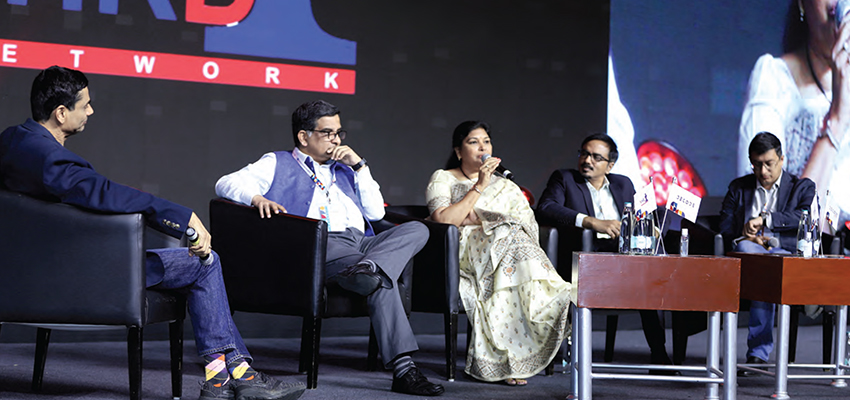
Role of People and Culture Function
India is racing towards a $5 trillion economy, a dream envisioned by Prime Minister Narendra Modi. As India becomes the most populous nation in the world, our demographic dividend is starting to pay off. However, the road to becoming an economic superpower is paved with challenges. It is important not just to address these challenges as HR managers, but also to formulate solutions which will accelerate this transition. At the 25th National Conference of the NHRD aptly titled ‘Decode the Future’, held recently in Hyderabad, a panel discussion was conducted called “Role of people and Culture Function to Make it Happen (India as a 5T economy)”, with an aim to address these specific challenges. Moderated by Krishnamurthy (Krish) Shankar, Group Head - Human Resource, Infosys, and featuring panellists, Kiran mai Pendyala , Head of Human Resources, India, Western Digital; Srinivas Rao Mahankali (MSR), CEO, T-Hub; Vijay Vemulapalli, General Manager and MD, ADP India and Vijay Sivaram, CEO IT Staffing, Quess Corp Ltd, the session brought some of the most burning questions to light and attempted to layout the most conducive path towards a $5 Trillion economy. Corporate Citizen brings you the riveting session
"We catapulted in India from an agriculture economy straight to a services economy. The whole digital play that we are running today, the whole consumption market that we are running today, we need to have all these factors running together simultaneously to reach the $5 trillion figure "
- Vijay Sivaram,
CEO - IT Staffing, Quess Corp Ltd
Krishnamurthy Shankar: Which country’s economy have you most been inspired by?
Srinivas Rao Mahankali (MSR): I think the country I’m most inspired by would be Israel. If you think about it, it is a small country, with very limited natural resources, surrounded by hostile neighbours. How they have been able to carve out a niche for themselves, both in terms of industry and their military, as well as innovation is admirable.
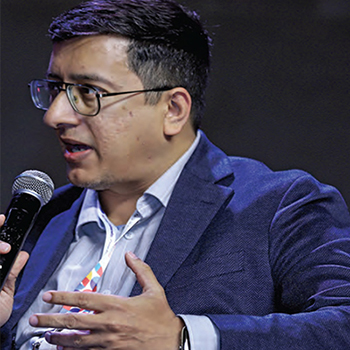
Kiranmai Pendyala: Israel is definitely at the top of my mind, especially when it comes to the start-up economy and various other facets of innovation, but I also look at Japan as a stellar example of the attitude of ‘never ever giving up’. Despite the numerous challenges the country has faced, the people of Japan collectively look forward to the progress of the nation. It is the collective power of the people and how they strive. The ethos of ‘How do you bat for the nation and not for yourself’, is beautifully etched in Japan.
Vijay Vemulapalli: The countries that impress me the most are Taiwan and South Korea. If you look at their journey over the last 10-15 years, they are small, they had geo-political issues, the per capita income was very low in those countries, but what they did is they invested a lot in their Human Capital and they also invested in their information technology.
Their education system and their information technology focus has led them to become the pioneers in the electronic industry.
"To get to the $5 Trillion goal, we need to bring a lot of compliance into our business and industries, lot of reforms in terms of tax, labour, and land. We need to focus on our infrastructure. We need to improve our logistics network and transport mechanisms. IT and Digitisation will also act as a catalyst "
- Vijay Vemulapalli,
General Manager and MD, ADP India
Vijay Sivaram: I have always been overwhelmed by the way Singapore runs themselves, and the way they reimagine themselves every 10 years. Whether it is the buildings that they build or the roads that they pave, it is only so much land that they have and only so much population that they have. I have always been amazed by the way they have been able to reinvent themselves completely. That being said, in the next five years, I see that the economy to watch out for is India.
Q: What do you think India needs to do to be a $5 Trillion economy?
Vijay Sivaram: I’ll introduce some data sets before I give you my opinion. We are in a very important juncture in our economy right now. There are three parallel things that are happening that are going fantastically well. For decades, India has not seen a movement on manufacturing. For the first time in the history of India, the manufacturing segment, which only contributed up to 15% of GDP till now, is going to spiral up by a significant amount. The agriculture economy, which houses close to 250 million people today, boasts of productivity data lower than any other country in the world. The whole agriculture economy is going to split into two parts — some people in the economy will continue with traditional agriculture, and the remaining agricultural workforce will migrate to a Tier-2 or Tier-3 city in search of jobs.
We catapulted in India from an agriculture economy straight to a services economy. The whole digital play that we are running today, the whole consumption market that we are running today, we need to have all these factors running together simultaneously to reach the $5trillion figure. The core requirement that is important for all these things is to create employment, to create skills which are relevant to these programmes.
Vijay Vemulapalli: Just by our sheer size as a country, we will get to the $5 Trillion goal. We just need to figure out how to accelerate that and go beyond that figure. To me, there are a few fundamental changes which must be done. We need a lot of economic reforms. We need to tighten our regulatory efforts we need to bring a lot of compliance into our business and into our industries. We need a lot of reforms in terms of tax, labour, and land. We need to make it more business friendly overall. We need to focus on our infrastructure. We need to improve our logistics network and transport mechanisms. IT and Digitisation will also act as a catalyst to help us move towards the $5 Trillion figure faster.
Q: If we were to become a $5 trillion economy, what are some of the challenges we have to overcome?
MSR: I think there are one or two main challenges. One is ease of doing business. In 2019, India had moved up several ranks from 141 to 63, but India still remains a complex, hard place to do business. The challenge is how to make it easier to do business. The second challenge is innovation. In the last six years, we moved from 80th rank to 41 on the innovation index, but we are still behind many countries. Even a small country like Estonia, which many of us would struggle to place on a map, is ranked 15. Ease of doing business, innovation, and infrastructure are the main challenges in my opinion.
Kiranmai Pendyala:There are many challenges, but most important is the readiness of the people. I am a people leader, and I will always battle for that. We can have fantastic policies and infrastructure and so on, but we are the most populous country today in the world. How do we leverage the human potential? Are we getting them ready for that tomorrow? Whether it is $5 trillion, $10 trillion or $15 trillion—it is just about getting started. Once you have that courage and conviction, it’s not just the government coming together, it is corporates, leaders, and every single one of us. If we think that we can train ourselves and continue to make everyone aware, how do we leverage this human potential in terms of upskilling, reskilling and continue to build the innovation capital, we will get the juggernaut rolling, and we will get from $5 trillion to $20 trillion.
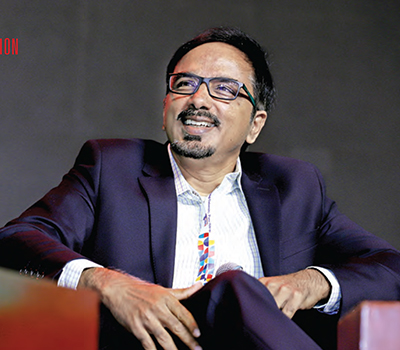
Q: What are some key skills which we need to keep in mind for the next five years?
Kiranmai Pendyala: Very clearly, analytical ability and dealing with ambiguity are skills we will need. It’s going to continue to be uncertain. While we can applaud ourselves for becoming the most populous country, we have an uphill task in training, retraining and the mind-sets which you touched upon. It is so important for everyone to own it and feel responsible. To feel ownership of the fact that together we can change this landscape and we have to enable that to happen. If we can ensure in every employee of every organisation the spirit of “How do I do this in order to make this dream come possible”, we can achieve it all.
We have so many industry verticals. If we can bring the ‘Make in India’ vision come true, then we can achieve so much. Honesty and Integrity are some of the other key skills that are essential. Are we executing our commitments on time? Our credibility and reputation needs to be upheld at every level of the organisation.
MSR:We are the third largest entrepreneurial ecosystem in the world now. We have 88,000 registered start-ups. That in isolation looks like a large number, but when you think of the fact that we are 1. 4 billion people, we are still at a miniscule number. both our academics and industry needs to incorporate what we call 21st century skills. These are critical thinking, creativity, collaboration and community. there is a lot of work that needs to be done on these areas. We talked about the demographic dividend, but where are the jobs? India needs more entrepreneurs, and for more entrepreneurship to happen, there has to be a lot more focus on 21st century skills.
"We are the most populous country today in the world. How do we leverage the human potential? Are we getting them ready for that tomorrow? Whether it is $5 trillion, $10 trillion or $15 trillion— it is just about getting started. Once you have that courage and conviction, it’s not just the government coming together, it is corporates, leaders, and every single one of us "
- Kiranmai Pendyala,,
Head of HR-India, Western Digital
Vijay Sivaram: While entrepreneurship is without doubt a fantastic thing to have, fostering an eco-system within an organisation to help employees to think and do something new, is also going to be a very important skill today. Inclusion is going to be a significant behaviour change which is required. I started Quess in 2007, and we just crossed 5 lakh employees a few months ago. Having inclusion as part of your ecosystem, and understanding the importance of having it in your workforce, is essential for your business to thrive. The last aspect is about the brand. It is important to know that the world is watching. We have to make the decisions that are right, not just for us or our organisations, but for the entire country.
Vijay Vemulapalli: I think, we need a little bit of improvement in the behavioural and soft-skills department. We also need cultural inclusiveness. Employees today are expected to work beyond their own set, be it a different state or even a different country. Understanding the nuances of that is an important skill for future employees to have. Emotional intelligence is the other aspect that companies need to focus on. We need to think how we can create an environment where employees feel comfortable in managing stressful environments. This is not going to come automatically. It’s going to be a systematic change that we need to invest in.
Q: If you were to look at India as a $5 trillion economy, what kind of behavioural changes do we need to see more, in our workforce?
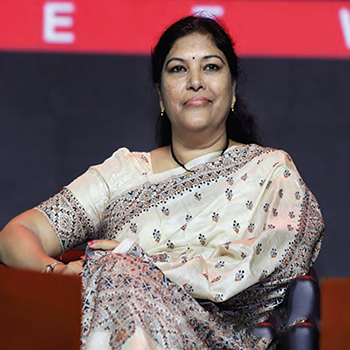
Vijay Vemulapalli: To me, the work force needs to have a can-do attitude, and they also need to think like an owner. We have to figure out a way to break-down the problem and translate it to a evel where every employee feels that they know exactly what is to be done, how to do it, and they are empowered to make decisions about getting it done. To make this possible, we do need to create an eco-system, but you also need to have an attitude of “I can do it”.
Q: What do you think are some of the behaviours we should stop doing?
Vijay Vemulapalli: I think we need to go beyond silos in the organisations, where the attitude is “This is my team or my department, or my project”. We need to think about the customer. We need to start having conversations about what it is that the customer wants, and keep the customer at the front and center of everything that we do.
Vijay Sivaram: I think what we should have is curiosity over competence. Competence today, can be learnt, can be built, but curiosity dies out. What we should not do is have resistance to change. Change is inevitable. Recessions, downturns are today more common than anything else. We should not create cultures that allow resistance to change. We should allow for and foster change.
Kiranmai Pendyala: I have a counter- intuitive way of looking at skills, abilities or competencies. Human intuition is that we are all tuned and programmed in such a manner. The moment you see red, it would mean risk and danger, so we would shy away from it. We would go into fight or flight mode. But I would have a clarion call to the employees of the organisation to embrace the red, and challenge the green. That’s where your stop, continue and start. The reason being that when you embrace the red, the fear of failure will go away. you will be ready to own it, and you will truly look at what is the goal, whether it is corporate strategy or business strategy. The fearlessness will give the authenticity and the ownership to move forward.
When I say challenge the green, that’s where complacency sets in. Keep looking under the hood so that nothing really fails. Constantly strive for perfection. While perfection is a myth, leaders must constantly question, introspect, and continue to work with their teams to inspire their teams. You must lead from the front.
MSR:I am a cricket nut. One of the reasons for this is that cricket is a great metaphor for life. You have to go through to a lot of ups and downs to get to the goal. There is one thing which I try to tell myself and everyone I work with, and that is to try and be the best you can be. We ask people to strive for excellence, but all of us don’t realise how much we can actually do, because we are only limited by our imagination, and our ability to push ourselves. When we start pushing ourselves, we realise that there are things which we can do, which we did not imagine we could do.
What I think we should avoid is complacency, to think that we have arrived at our destination. I also believe we should never settle for mediocrity.
"Try and be the best you can be. We ask people to strive for excellence, but all of us don’t realise how much we can actually do, because we are only limited by our imagination, and our ability to push ourselves. When we start pushing ourselves, we realise that there are things which we can do, which we did not imagine we could do "
- Srinivas Rao Mahankali (MSR),
CEO, T-Hub
Q: What should we in HR actually do to instil this kind of behavioural change in our workforce?
Vijay Sivaram: Nothing can beat communication. The underlying effect is much higher when you communicate. Today, post pandemic, with the hybrid workforce, it is very important to engage. We engage with the employee when we hire them, we engage with them during the exit process, but somewhere during the time that the employee is in the organisation, we put a brushstroke across. We forget the individuality of the human being through that journey.
MSR: I think as leaders, we have a role to inspire. It’s important to lead both by thought and deed, and you can’t ask people to do things which you are not willing to do yourself. I’ll also pick up on what Vijay said, which is the importance of empathy and communication. We must treat everyone, not as an object, not as a number, but as somebody who is coming in everyday and adding value to what you are trying to do as an organisation.
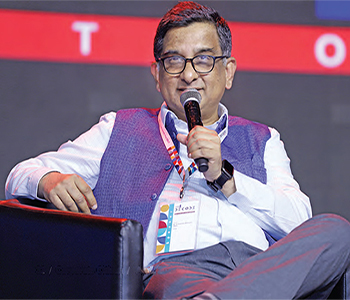
Vijay Vemulapalli: From an HR point of view, I see HR as a custodian of culture and the change that happens in an organisation. I am not an HR person, but HR is the front end of the entire experience of an employee. I feel integrity is everything. Every employee counts. Every interaction counts. They are very important aspects for any person to be treated with respect and with the empathy that they deserve. I think with work-pressure, deadlines and other issues, we have missed out on empathy. HR is there to remind us of that.
We have a large young population coming into the workforce and this is going to be the case for the next 30-40 years. I want to ask HR if they are ready for this? I have seen that HR is the last part of the organisation, which embraces the change. For us to get beyond a $5 trillion economy, we need to start looking at what else we can do, how can we change the on-boarding experiences, and how do we change the recruitment process? In most of the western countries, women’s contribution to GDP is close to 40%, whereas in India it is 17-18%. there is a lot of untapped talent that we have. We have to ask ourselves how do we go about engaging them. We have some cultural aspects where women are expected to take care of families. Are we challenging those notions? Are we making it easy for women to get back into the work environment? If only we get our women workforce participation closer to the global 40%, we’ll be adding $1 trillion to our GDP solely on the basis of that number.
We must also ensure that we make our work environments easy for associates to move around, in the sense that they are given the ability to challenge the status quo safely, they have the ability to question those policies and be part of those policies and be part of the policy making process. HR needs to be part of the business. That’s the change that we need to be able to propel ourselves forward towards a $10-$15 trillion economy.
Q: You said HR is the last to change in an organisation?
Vijay Vemulapalli: I feel that HR is at the start of the policy making process, they guide in making the policies, they help in creating the culture, because it is their own baby. But that is exactly why it is so difficult for them to go and make changes to it. The business is rapidly changing, the young workforce is coming into the work environment, the question we need to ask is whether we are ready to embrace the change? Are we talking the same language, are we open to the newer culture that is coming into the workforce? HR needs to have an overall perspective about how policies and decisions are going to impact the entire organisation.
Kiranmai Pendyala: I think resistance to change is universal. Its not specific to HR only, but I love the fact that you acknowledged that the organisation is the HR’s baby and hence there is an attachment. What I would like to add is that we all talk about inclusion, we talk about diversity. If we are really going to march towards a $5 trillion economy, the first thing all of us have to understand and embrace in the workforce is cognitive diversity. The moment we recognise and realise that each individual is unique and different, and play on his or her strengths, I think that is where the change will happen. If we can build that, that is one thing that will help make mountains move.

Q: What should we do to foster diversity in the workforce?
Kiranmai Pendyala: I think the train has already left the station. Many organisations have already embraced this, and they are very conscious in terms of creating their talent strategies. At Western Digital, we talk about the 4G. This stands for generational cohorts, and we are looking at how we can bridge and make the collaboration successful. We also talk about geographical diversity. India is such a vast nation, and you can draw in from all parts of the country. Then there is gender diversity, which we have talked about. The last one is LGBTQ, which is still very nascent. The reason we are bringing that is not because it is fanciful or a fad, because it is becoming a business imperative. Having talked about this, we don’t stop there. If you really want the innovation capital to grow, you look at which are the groups or elements which are straggling behind. We started looking at the innovation engine—for example, if we have 20% women in the workforce, we looked at how many of them were contributing to IP generation, be it trade secrets or patents. We started creating a coaching environment, making them understand the process. And we have already tasted the success of it, where we realised that they are able to come out in full force and within one year, we have seen a stupendous 40% of the women who have participated in the programme, who have got trade secrets assigned as well as patents filed. A small leap, but as we have started taking those steps, we are moving in the right direction. Every single organisation is making its own strides. We can all do a lot if we have the right intent and focus.
Vijay Sivaram: The young generation is the two-minute generation. They are the Tik Tok generation. Their expectations change every two minutes. We can never match up to their changing expectations. What is important in my opinion is intent and method. If you have the intent to do something, to figure out what they want, to include them, to ensure that they are engaged, that comes across. If you have the intent, then you need to formulate the method to get it across. Most organisations have the intent, it is the method where they struggle.
Q: There are brands associated with countries, for example, Japan is known for quality and Germany for precision engineering. Where should India position ourselves?
MSR: We are a very diverse country with multiple ethnicity and languages. We know intrinsically how to handle diversity. Unlike our neighbours, we have remained a democratic and free society. We are able to handle complexities. We are able to service the largest group of people at scale, at a lower cost. Being able to innovate frugally is our strength.